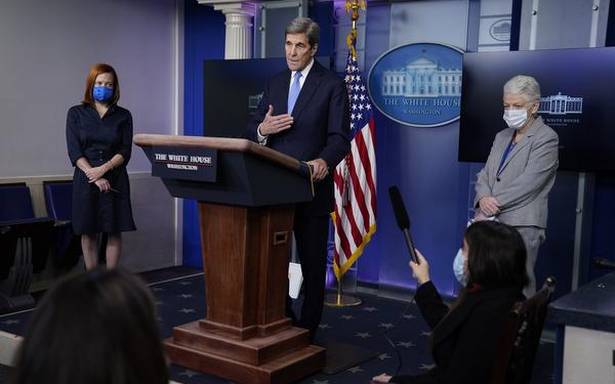Under climate-change sceptic Donald Trump, the United States failed to deliver two-thirds of a $3-billion promise to the Green Climate Fund.
The United States will produce a plan to end international financing for fossil fuel projects, its special climate envoy John Kerry said Wednesday, as senior British and U.N. officials urged donor nations to meet a flagship climate finance promise.
Speaking at an online panel organised by the World Economic Forum, Mr. Kerry said the new administration of U.S. President Joe Biden would draft a plan for U.S. climate finance, without giving further details.
He noted the United States had spent $265 billion cleaning up three major hurricanes that hit the country in 2017, while another storm in 2020 racked up a bill of $55 billion.
Yet "in stark contrast, we don’t fully fund" a commitment by wealthy governments, enshrined in the Paris Agreement, to raise $100 billion a year globally to help poor, vulnerable nations adopt clean energy and adapt to extreme weather and rising seas, he said.
Earlier in the week, Mr. Kerry told an international climate adaptation summit the U.S would "make good" on its climate finance promise, without specifying when or how.
Under climate-change sceptic Donald Trump, the United States failed to deliver two-thirds of a $3-billion promise to the Green Climate Fund, set up under U.N. climate talks to help developing countries tackle global warming.
Alok Sharma, Britain’s president for the COP26 U.N. climate conference in November and a former business minister, told the WEF event the $100 billion promise was "absolutely totemic".
"It’s a matter of trust. We donor countries have to deliveron that," he said, noting it was not just about government funding but also raising private money to tackle climate change.
In December, U.N. chief Antonio Guterres warned rich nations were "lagging badly" on the $100-billion-a-year commitment, due to kick in from 2020 onwards, after a report showed it would likely be missed as donor finances were strained by the COVID-19 pandemic.
Welcoming the U.S. announcement that it aims to end overseas funding for fossil fuel projects, green group Friends of the Earth noted that in the past five years the U.S. International Development Finance Corporation (DFC) and its predecessor, the Overseas Private Investment Corporation, had approved almost $4 billion for such projects.
In addition, the U.S. Export-Import Bank (EXIM) approvedover $5 billion for fossil fuel projects abroad in the last two years, it said.
Both have backed fossil fuel projects all over the world, including in Argentina and Mozambique, Friends of the Earthadded.
"It is high time that EXIM, DFC and the rest of the U.S. government stop destroying local communities and the environmentby propping up fossil fuel projects abroad," said Kate DeAngelis, the group’s international finance programme manager.
"We look forward to an immediate end to this dirtyfinancing," she said in a statement.
In December, the British government also promised to stop further state support for oil, gas or coal projects overseas, including via development aid, export finance and trade promotion.
U.N. Deputy Secretary-General Amina J. Mohammed told the online WEF panel that rich nations needed to show at the COP26 summit they were serious about meeting their $100-billion-a-year pledge.
"It’s not going to get us… to where we want to be" on climate action, she said. "But it’s the handshake that gives people the trust across that bridge for all of us to do the things we need to do."
A climate finance "roadmap" from the United States could help spark concrete steps, she noted.
Countries that have done the most to cause climate change have not been willing to put in the investments needed for all to embark on more ambitious climate action together, including nations that have little financial means to do so, she said.
"There’s already been so much damage, and you cannot inflict more pain on those who are now trying to grow," she added.
Source: Read Full Article

